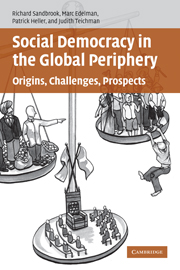1 - Social democracy in the periphery
Published online by Cambridge University Press: 22 September 2009
Summary
In A Bias for Hope (1971, 28), Albert O. Hirschman enjoined social scientists to embrace “a passion for the possible.” Our primary task, he noted, is to understand probabilities, in the sense of uncovering regularities and uniform sequences. If we limit ourselves to this task, however, we risk fortifying a paralysis of the will by casting situations of backwardness, injustice, or oppression as the inevitable outcome of universal laws. Hopeful cases of social progress will then be dismissed as merely exceptions to the general rule. To avoid this negative tendency, social scientists should also search for possibilities – the often hidden opportunities for valued change that lurk in a particular situation. Hirschman's own work sought to widen the limits of what is, or is perceived to be, possible.
This book seeks to do the same thing. It focuses on social-democratic regimes that have, to varying degrees, reconciled the exigencies of achieving growth through globalized markets with extensions of political, social, and economic rights. We show that opportunities exist to achieve significant social progress in the periphery, despite a global economic order that favors the core industrial countries. We explore what has been attained in certain countries, and how and why social-democratic experiments have succeeded, in the hope that this exploration will suggest possibilities for similar achievements elsewhere. Our findings derive primarily from a comparative analysis of four exemplary cases: Kerala (India), Costa Rica, Mauritius, and Chile since 1990.
- Type
- Chapter
- Information
- Social Democracy in the Global PeripheryOrigins, Challenges, Prospects, pp. 3 - 34Publisher: Cambridge University PressPrint publication year: 2007
- 3
- Cited by

